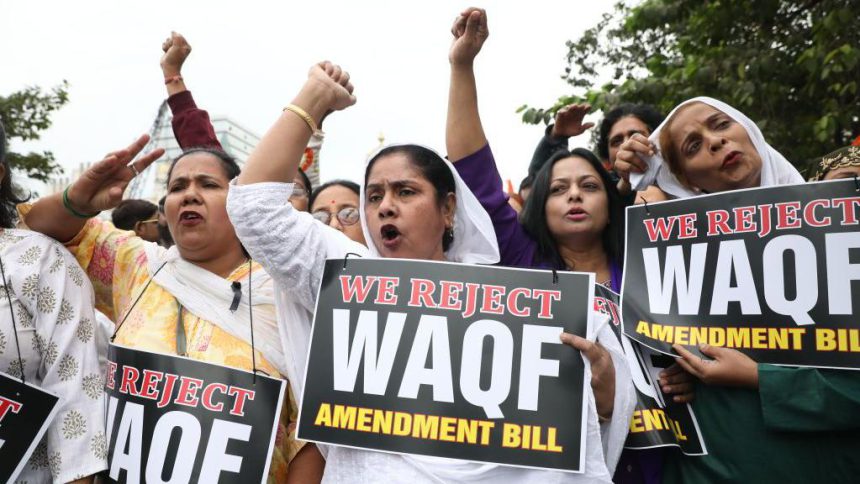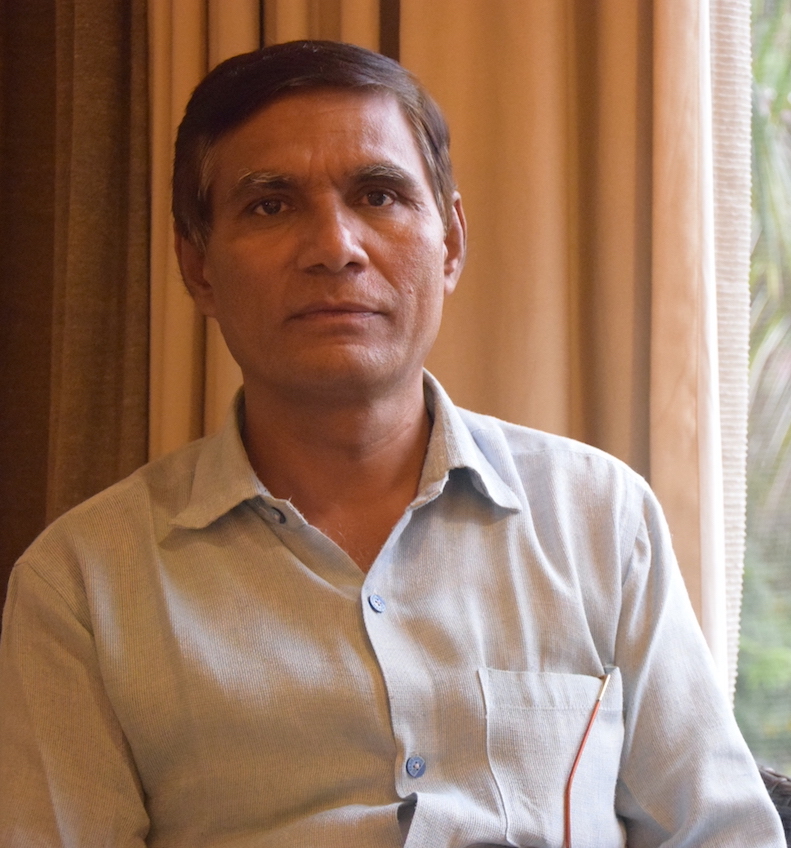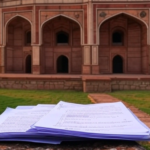This is the fourth interview in our BeyondHeadlines Waqf Interview Series. Today’s conversation is with Saleem Mulla, a dedicated Waqf activist based in Pune, India, who has been working at the grassroots level to protect and promote Waqf properties. Mr. Mulla is the president of the Waqf Liberation and Protection Task Force, which he founded in Pune in 2016. The organization is now active in 20 districts across Maharashtra.
The life of 62-year-old Saleem Mulla is a testament to perseverance and purpose. Born in Kannarwadi village in Maharashtra’s Satara district, Saleem faced hardship from the beginning—his father passed away just 40 days before his birth. His mother, who worked in fields and homes, not only raised him but also taught him to read and write at a time when education was not highly valued in the community.
After completing the 10th grade, Saleem enrolled in an Intermediate Science course in Kolhapur. However, due to financial constraints, he had to drop out after the 11th grade. Encouraged by a mentor, he joined the Industrial Training Institute (ITI) while simultaneously enrolling in an Intermediate Arts program. His intellectual promise was evident early on—he scored an impressive 69% in his 10th board exams, a rare achievement in those days.
While studying at ITI to become an electrician, Saleem also opened a small shop and managed to pass his 12th-grade exams with first division. Though he secured a job after completing ITI, he preferred self-employment and eventually moved to Saudi Arabia, leveraging his skills and determination. He spent over seven years working in Saudi Arabia and Bahrain before returning to India and settling in Pune, where he began a new chapter of struggle and service.
Today, Mr. Mulla runs his own tent rental and event management business while also devoting significant time and energy to Waqf activism.
BeyondHeadlines had the privilege of an exclusive conversation with Saleem Mulla. Here are some key excerpts from our conversation:
You have long been engaged with Waqf-related matters and have closely observed the challenges facing the Muslim community in India. How do you assess the approach of Muslims, particularly Muslim organizations, toward the Waqf issues?
There is little use in discussing the role of Muslim organizations in this matter. They have shown little to no concern for the protection of Waqf properties, nor do they seem to grasp even the basic principles of what Waqf truly represents. I have made several attempts to bring them together and raise awareness on this critical issue, but my efforts have largely been ignored. Their primary interest, it seems, is not in safeguarding Waqf, but in finding ways to gain control over some part of it for their own purposes. Engaging in further discussion about them serves no real purpose.
My real grievance lies with the members and government-appointed officers of the Waqf Board—those who were entrusted with the responsibility of protecting these sacred assets, the ‘property of Allah’. Tragically, they have failed in this duty, and in fact, the greatest damage to Waqf has occurred because of their negligence and misconduct. Therefore, it is essential to focus our attention on them. The conversation must now center around what steps we—and the government—need to take to hold them accountable and ensure meaningful reform.
The current functioning of the Waqf Board raises serious concerns about governance, transparency, and adherence to legal norms. Reports indicate that many board members lack the practical experience required for effective oversight, resulting in instances of mismanagement and alleged misconduct.
Equally troubling are persistent allegations of unethical practices, including the illegal transfer and sale of Waqf properties through legal loopholes and the misuse of government resolutions (GRs) to benefit select individuals. These actions fundamentally betray the purpose of Waqf institutions, which are established to serve the welfare and upliftment of the Muslim community.
In light of the serious allegations surrounding the Waqf Board, the following immediate measures are essential to ensure accountability, transparency, and lawful governance:
1. Independent Probe – The Home Department must initiate a comprehensive and impartial probe into the operations of the Waqf Board, specifically targeting financial irregularities and unlawful property transactions.
2. Public Disclosure – All Waqf properties must be listed on an official website to ensure transparency and prevent unauthorized sales or misuse.
3. Legal Accountability – Board members found guilty of corruption or malpractice must face swift and stringent legal action under applicable anti-corruption laws and, where necessary, provisions such as the Maharashtra Control of Organised Crime Act (MCOCA).
4. Strict Vetting Process – Police verification and background checks should be mandatory for all Waqf Board appointees to prevent individuals with questionable integrity from holding positions of authority.
5. Ending Favoritism – Waqf organizations must operate independently, free from undue influence by board members who may exploit their positions for personal gain.
The government must take firm and immediate action to uphold accountability and ensure that Waqf properties are managed with integrity, transparency, and in strict accordance with the law—always prioritizing the welfare of the community they are meant to serve.
The government claims that the Waqf Act 2025 has been introduced for the welfare of Muslims. If that is the case, where does the problem lie? In your view, how and why could this Act pose a threat to the interests of the Muslim community?
If this law had truly been introduced for the welfare of Muslims, there would be no need for justification. The people of the country would naturally welcome it, recognizing the government’s noble intent. However, the reality is quite the opposite—this legislation has sparked deep concerns and poses a serious threat to India’s socio-religious fabric.
The central government’s amendments to the Waqf Act have triggered widespread concern, as they are widely perceived as a threat to the autonomy of Waqf Boards. This move is being viewed as a significant overreach, raising serious questions about religious freedom and suggesting that the government’s priorities may be misaligned with the genuine needs and challenges faced by Waqf institutions.
This amendment signals a troubling shift in policy that warrants immediate reconsideration. The government must uphold constitutional principles of equality, justice, and secularism, ensuring that no community is sidelined under the pretext of legal reform.
In your opinion, what steps should Muslims, particularly the youth, take in response to the current situation?
Today, many young people are unaware of the concept of Waqf and its significance. They often lack understanding of Waqf, its social benefits, and its role in community development. Even ordinary Muslims frequently ask, “What benefit does Waqf bring to us?”
In this context, it becomes crucial to raise awareness among the Muslim community about Waqf—its purpose, its advantages, and the reasons why it has not yielded benefits for many. One key reason is that people themselves have shown little interest or involvement in it.
Therefore, it is the duty of our Waqf experts, elders, scholars, and community leaders to educate the youth about the value of Waqf. Organizing workshops, seminars, and training programs can be an effective way to inform and engage the younger generation.
At the same time, the youth must take responsibility. Instead of blindly following self-serving leaders, they should actively seek knowledge about Waqf—utilizing the internet, reading books and articles on the subject, and then reflecting on how they can contribute. If Waqf is to be revived and preserved, this initiative must come from the youth themselves.
Our elders, in turn, should entrust the management and upkeep of Waqf properties and welfare projects to young people. They must nurture leadership among them by providing opportunities and encouraging them to lead with vision and responsibility.
And yes—let’s be clear. The greatest threat to India’s Muslim community does not come from outside forces, but from within—specifically, from its own corrupt leadership. Among the worst offenders are those in powerful positions within the Waqf Board and related institutions. These individuals have betrayed the trust of the community, turning sacred Waqf properties into personal assets through corrupt deals, illegal sales, and legal manipulation.
As we look toward the future of Waqf, it is equally important to confront the failures of the past. Those who have exploited the Waqf for personal gain must be held accountable. They must face investigation and prosecution. Investigative journalists also have a crucial role in exposing the misuse of Waqf in the name of public service and bringing the truth to light.
To the youth especially, this is a message of urgency: do not fall for the illusions created by self-serving leaders who are sacrificing your future for their own benefit. Educate yourselves. Question authority. Demand transparency. Stand up for justice. Because if you don’t wake up—no one else will.











Very nicely articulated
The truth and nothing but the truth ۔
Our own black sheep need to be fixed ۔
Congrats Mulla saheb for the clarity ۔